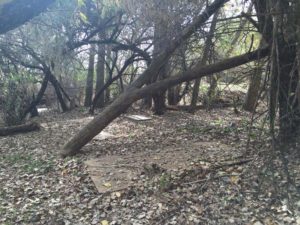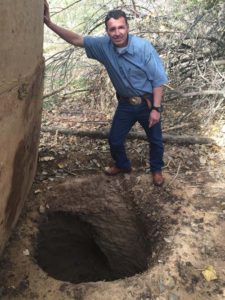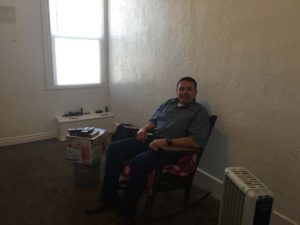I learned a great deal from Victor – about being homeless, about living with a brain injury, about resourcefulness, about hope and positive change, and about the ways lives can touch each other during the process.
Meeting Victor
During the summer of 2016, a new person came to my church. He attended the Sunday School class I taught, sat at the front and introduced himself as Victor. He was neatly dressed, well mannered, friendly and eager to participate in class. Through his comments and a few conversations we had outside of class, I learned a little about his background and experiences as well as his feelings about the Church. It wasn’t until after he had left our Ward and moved into an apartment in Ogden City, that I learned more about his story. I was fascinated to hear about his travels and unique living arrangements and wanted to learn more. He was gracious to sit down with me and share his story.
A Traumatic Brain Injury
Victor began by telling about a life-changing experience in 2013. He was waiting for a bus in Phoenix, Arizona when he was attacked by three men. One hit him over the head with a baseball bat, knocking him out. Then they robbed him. After he came to, he managed to walk to a nearby hospital, then he was transferred to a trauma unit for emergency brain surgery. He has continued to suffer from the effects of this traumatic brain injury. He has seizures and memory issues which have made him unable to work.
During his life, Victor has lived in many places. He grew up in Tucson, Arizona. At the time of this injury he had returned to Arizona for his mother’s funeral. He had lived in Ogden about twenty years ago with his wife and children. During the time he lived here he was introduced to the Church of Jesus Christ of Latter-day Saints and attended meetings. He said that where ever he lived after that, he would look up the local Church and attend meetings.
Life as a Hobo
After getting divorced, Victor became somewhat of a drifter – a hobo is how he described his life. He explained the reason as: “one day I just decided to take a freight train. Why? I just wanted the experience.” He had known hobos in his early life. At about twelve years of age, he had a paper route which went by a park where hobos would camp. His curiosity resulted in conversations with them and he found something attractive about the idea of traveling on freight trains.
He began hopping on trains – actually getting on them when they were sitting in a train yard and often waiting for days for the train to actually start going somewhere. (This was very dangerous and he does not recommend it to anyone. There are not empty box cars anymore, but containers stacked on the cars, so much of his riding was out in the open with not much to hang on to.) Victor said “Actually I got hooked on it. To me it was an adventure. Along the way I would stop in different states and work and get a job.”
Later in his story, he admitted that alcohol played a significant part in his divorce and this lifestyle. It started when he was a young construction worker. He explained, “What do construction workers do, at least most of them, after working on a hot day? You want a cold beer, especially in Tucson Arizona, cause in the summer it gets really hot there. So I started off drinking with the co-workers, cause being Catholic it was the normal thing to do. I found myself drinking with them every day. Pretty soon, it got to where I had to drink, whether it was with them or by myself. So actually I became an alcoholic. That’s what I would do when I was riding the trains. I would get a bottle of whiskey and jump on a train. I never got lost because I never knew where I was going.” This lasted about four years, with his longest time in one area being Boone, Iowa, where he worked for some time for a trucking company.
“You see, there is a difference between a bum and a hobo. So I consider myself a hobo. A hobo is one who travels to look for a better life. That was basically what I was doing.”
Conversion
Some time after his brain injury, Victor went to Coeur d’Alene, Idaho and lived with his oldest son. Subsequent events there further changed his life. He had training and experience as a brick mason, but seizures made it dangerous for him to continue this kind of work. He also had culinary training, so in Idaho he started working in a restaurant. Memory difficulties from the brain injury caused problems with this job and he was let go. He was convinced there that he was unable to work. He applied for disability, but was denied at that time.
Another significant thing that occurred in Idaho was that after many years of association with the LDS Church he was finally baptized. He related the story: “I met this man and he invited me to the church. So every Sunday he would come pick me up and take me to church. Then one day he asked me, ‘Have you every thought about getting baptized?’ I said, ‘You know that is a good question.’” He had related to this brother an experience he had when he lived in Ogden years before: “One day some missionaries came knocking on my door. I don’t want to sound funny or anything like that, but I didn’t even know what a Mormon was. I opened the door and invited them in. So they started explaining to me who they were and what they were doing. They asked me if I ever heard about the Church of Jesus Christ of Latter-day Saints. I said ‘No, what is that?’ So they started talking to me. They showed me a Book of Mormon and they started explaining the history. I took an interest. To me, this sounds like this is true, and this is possible. And as I started reading the Book of Mormon, it tells you in the book if you really want to know the truth of it, just pray about it. That’s what I did. I got on my knees, I raised my hands up to heaven, and prayed about it. And I got this feeling like I had never experienced or had in my life. It started from my fingertips and came all through my body and out my feet. It was a feeling of peace, warmth, and love. There’s where I knew this is true. It has to be true. Although I didn’t get baptized right away, I continued going to the LDS church.”
During his hobo travels, Victor did make some efforts to stop drinking. He tried AA and got into some programs. He said “Nothing ever worked until I got baptized. I started living the word of wisdom, really started taking church seriously – the Church of Jesus Christ of Latter-day Saints seriously, and participating in the church. My life changed forever. That’s what got me sober. . . I call it a miracle.”
He did admit to having some relapses. He related, “I did one time and an amazing thing happened, which I never thought in my life thought would happen. This was the Holy Ghost. I did not like the taste of alcohol no more. It actually made me sick. I didn’t like the feeling it gave me anymore. Especially the next day I was desperately sick. I was just very, very sick. I did not like the taste anymore and I didn’t like the effects.”
Homeless
After losing his job in Idaho, Victor decided to go to California. He spent some time in Long Beach, mostly living on the beach. He also lived in Portland, Oregon and San Francisco. In Portland he often slept at the airport. He found a couch in a corner of a public waiting area where he would spend the night.
In San Francisco, “I found me an underground garage where they would park cars and there was like a room down there. It had a little door, probably 3 x 3 feet. One day I seen it and I decided to open it and see what was in there. So I opened it and there was a great big room there. I had to kind of crawl in there. So I said this is a good place to live until I get my disability. So I got me a foam mattress, a sleeping bag and basically I would just sleep there. During the day I had my appointments. . . I got, they call it General Assistance, GA, as well as food stamps and that is how I survived. . . There was a hospital across the street, which was another good thing. . . I would go across the street, watch TV. They also had a cafeteria down there. And that’s where I would get cleaned up. You couldn’t even tell I was homeless. I looked just like I look now. My clothes I always had clean. I’d go to a Laundromat to do my laundry. That’s how I survived.”
He was told about a program in San Francisco that helped people get back on their feet. With the help of professionals there he started the process to apply again for disability payments. He finally decided that San Francisco was not a healthy environment to be living in and he remembered Ogden. So he went to Oakland where he found a freight train and began his last train ride as a hobo. After getting off in Ogden, he suffered a seizure and was taken to McKay-Dee Hospital, then sent to the Lantern House. He spent a few nights there, but it was hard for him to be around some of the people there.
Then he found a unique living arrangement. He relates, “I believe our Heavenly Father guided me to the Ogden Regional Hospital. . . I was taken by ambulance because I felt I was about to have a seizure, so they took me over there. When I got released I went across the street to the library. From there I kinda saw like a little woods right next to there. It got my curiosity. I said, ‘I’m going to go check this out.’ So I went over there. I said, ‘I have a better chance of surviving out here and over here than I do in these shelters.’ So I decided to dig me a bunker and I actually lived there for three months.”

Victor’s camp after he had moved out
Victo set up camp there in the woods. He hauled water from nearby buildings, found outlets to charge his phone and plug in his crock pot. He also cooked over a fire. He washed his clothes in a five gallon bucket and hung them from a line between trees to dry. During the day he spent time in the library reading and going around town. He continued to pursue getting disability, so had various appointments.
As he anticipated the weather turning bad, he knew he would need more shelter. He explained, “I have lived here before and I know what the winters are like. It gets cold and it snows.” One day, after visiting a lawyer about his disability, he found a hammer and with this he started digging a hole. Later he found a broken shovel which he was able to repair with a pipe he found and then he had a better tool. “I figure I invested maybe 90 hours altogether digging that bunker. It took me, I would say two to two and a half weeks, cause there was days I would work on it and days that I wouldn’t. The days I would work sometimes it would be twelve hour days, sometimes it would be 4, sometimes 5. It just varied. I seen myself making a lot of progress. Sometimes I had to force myself stop, cause there was nights I’d work until 3:00 in the morning.”

Victor holding up the plywood which covered his bunker
After working for weeks, he had a hole large enough to stretch out and sleep in.“When I would leave, I would put everything in my bunker, put a piece of plywood on top, spread dirt on top, put a few branches on top. Nobody would even imagine there was somebody out there living. Let alone where I kept my stuff. You couldn’t even tell.”
Victor actually enjoyed living there. He said, “It was very peaceful. I enjoyed looking up seeing the stars, seeing the moon. Plus I made friends. Deer would actually, first they were curious – ‘who is this guy?’ They knew over time that I wasn’t gonna hurt them. So I remembered, well, deer like apples. . . ‘I’m going to start feeding them.’ So I started buying bags of apples and whenever I saw them I would throw apples at ‘em. They started eating the apples. I started naming them – Snoop, Snops, Hans. They would actually come visit me every morning. It would bring so much peace and joy to my heart to see them, knowing they were coming to visit me. Finally, they would look at me and then start sniffing around the ground and then look at me again, that was actually letting me know, ‘where’s our apples?’”
A Real Home
As some members of our Ward learned of Victor’s situation, he was helped to find resources and eventually moved into an apartment. Arrangements were made for him to stay at a motel briefly right before a tornado hit Washington Terrace in September. When I visited his camp site there were rather large trees that he said had blown down during the tornado. He was blessed not to have been there then.
Victor is hopeful for the future. He is extremely grateful for even the simplest things. “Everything came together perfect. We were about to get snow any day now. Now I have a place to live and my check will be on the first. So everything came together so perfectly. It is just amazing. I believe it but sometimes have to pinch myself, this really happened.”

Victor in his apartment
“ I know from experience that I am a living witness that if we do the right thing, good things happen in our lives.”
